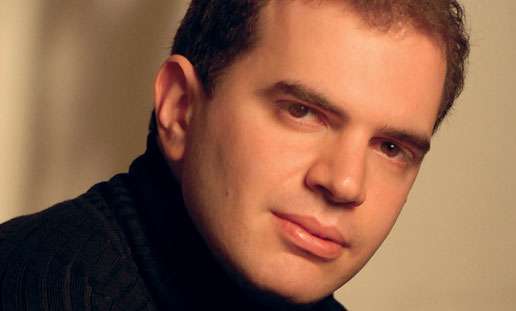|
Back
Music From a Secret Loft New York
Kaufmann Auditorium, 92nd Street Y
04/21/2012 -
Johann Sebastian Bach: English Suite No. 6 in D minor BWV 811
Ferruccio Busoni: An die Jugend: Giga, bolero e variazione (Studie nach Mozart)
Oliver Knussen: Ophelia's Last Dance, Op. 32
Carl Maria von Weber: Aufforderung zum Tanze, Op. 65
Robert Schumann: Carnaval, Op. 9
Franz Liszt: Selections from Soirées de Vienne, valses caprices d'après Schubert
Kirill Gerstein (Pianist) 
K. Gerstein (© 92St.Y)
My first thought after the opening minutes of last night’s recital was “What the hell has happened to Kirill Gerstein?”
When Mr. Gerstein performed at Poisson Rouge, he had strolled on stage, didn’t look at the audience, but launched, with total verve, into both books of the Brahms “Paganini” Variations. That was magical.
And with that in mind, I was anticipating great things indeed inside the more distingué confines of the 92nd Street Y.
So what had happened in the meantime? Why was the Bach English Suite so brittle, so colorless? He may have been a technical whizz for Weber’s Invitation to the Dance, but the tones were cold, the dance rhythms restrained to a deadening dullness. (And unforgivable was the audience applause before those final inspired quiet measures.)
Even Oliver Knussen’s so delicate, so nostalgic Ophelia’s Last Dance, a work actually dedicated to Mr. Gerstein, needed either some yeast or oomph to allow it to rise, to float.
The problem was not that of the artist. The solution was offered me in the intermission, when I ran into an eminent pianist, who asked me in disbelief, “And what are you doing sitting downstairs? Even the best pianists are bound to sound bloodless in this part of the hall. C’mon up to the balcony.”
Now a) I didn’t know the Kaufmann Concert Hall even had a balcony; b) Having originally been called the “Young Men’s Hebrew Association”, I would have thought the 92Y balcony was reserved for women.
But c), Once I traipsed up the steps to that hidden aerie...well, that was where I finally listened to the real Kirill Gerstein. And that, as I had expected, was more sensational, more sensually sensational than I had anticipated.
He played only two works, but both of them had the most singular element for a young pianist, especially a pianist who had come from Russia to America to study jazz. For Mr. Gerstein’s performance of Liszt and Schumann harked back to a what one imagined was the great European playing of a century ago. Not the exaggerated rubati and eccentric clanking of pure virtuosity. But playing in the grand style, with an all-embracing understanding of his music.
The most substantial work was Schumann’s Carnaval, a work for which, like the aforesaid Brahms, Mr. Gerstein seemed to have been created. Too frequently the individual pieces are played as individual vignettes. Mr. Gerstein owned Carnaval as a single joyous work, each section tied and bound to the one before it.
Yes, his “Pierrot” had a contrast of jumping and dancing, so his “Harlequin” leaped into the air. Both were both part of the same comedy. His “Chopin” had that understated passion that unerringly attached itself to the longing of “Estrella”. And all of the music danced into a grandiose march and finale.
When Mr. Gerstein did–and what the true sounds of the Steinway showed, up in the balcony–was to give a Carnaval intimate solo pieces within a container of the whole work. No words can describe his innate mastery of the period and the genre. The only word to describe our own feeling was spellbound.
Schumann’s transformation of Central European moods and artists was echoed in the all-too-short Liszt transformation of Schubert from his Evenings in Vienna. This was Liszt without literature or philosophy, but pure Lisztian joy, and it was played with that same magnificent grandeur.
Encores are not usually commented upon (and I was reluctant to hear anything else after the Schumann), but Kirill Gerstein followed that same tradition of musical metamorphosis with his version of I Got Rhythm. Yes, it was an unbelievable tour de force, but it was equally an homage to Gershwin.
As Gerstein’s own playing–from this newfound secret loft–was an homage to music-making in the grand style.
Harry Rolnick
|